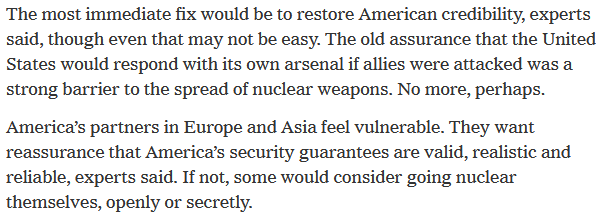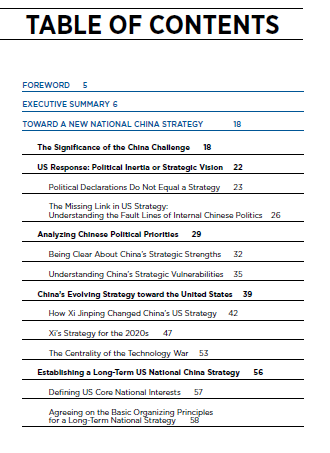
Because it apparently needs to be said: "Imperial Policing" is not a good model for US foreign policy to imitate.
[THREAD]
[THREAD]
This thread is prompted, in part, by this statement from Robert Kagan (h/t @mcneillcasey for highlighting it) in a new @ForeignAffairs piece. 

Here is the full article
foreignaffairs.com/articles/unite…
foreignaffairs.com/articles/unite…
But Kagan is not alone in expressing this view. @MaxBoot wrote a @washingtonpost piece back in 2019...
washingtonpost.com/opinions/globa…
washingtonpost.com/opinions/globa…
This sentiment can be picked up even in a recent @CNN piece by @madeleine & @FedericaMog
cnn.com/2021/02/16/opi…
cnn.com/2021/02/16/opi…
To be clear: Albright & Mogherini are not calling for indefinite "policing" in the same manner as Boot & Kagan.
But they do write how the US must hold the Taliban "accountable" & shouldn't leave Afghanistan while there remains the potential for it to become a terrorist haven.
But they do write how the US must hold the Taliban "accountable" & shouldn't leave Afghanistan while there remains the potential for it to become a terrorist haven.

So what these pieces share is a advocacy for staying in Afghanistan (or other places where the US is engaged in "low-level war") in order to prevent a greater threat from arising.
That is the core idea behind "Imperial Policing"
That is the core idea behind "Imperial Policing"
The term was coined in the 1930s to describe how Britain was adapting its post-WWI army for colonial policy
tandfonline.com/doi/abs/10.108…
tandfonline.com/doi/abs/10.108…
...published a book in 1934 by the title "Imperial Policing".
books.google.com/books/about/Im…
books.google.com/books/about/Im…
The book, which was to become an official field manual for the British Army, called for lighter forces to maintain control with firm & timely action. This would prevent worse violence from arising.
See @RJohnsonCCW1's informative exploration of the policy
tandfonline.com/doi/full/10.10…
See @RJohnsonCCW1's informative exploration of the policy
tandfonline.com/doi/full/10.10…
This approach was attractive in an budget environment marked by the "10-year rule": the armed forces should draft their estimates "on the assumption that the British Empire would not be engaged in any great war during the next ten years"
tandfonline.com/doi/abs/10.108…
tandfonline.com/doi/abs/10.108…
So "imperial policing" is a budget-conscience means of preventing large-scale revolts in the later years of the British Empire.
Since that time, the US isn't the only actor that has been accused of continuing the model. Indeed, some see UN peacekeeping as an application of the policy.
tandfonline.com/doi/full/10.10…
tandfonline.com/doi/full/10.10…
What is wrong with this model?
First, it is designed to "never end". The forces must always be present.
First, it is designed to "never end". The forces must always be present.
As @JoshRovner1 wrote in @WarOnTheRocks: "This vision does not imagine an end state, just as there is no moment in which police can declare victory over crime."
warontherocks.com/2017/11/the-wa…
warontherocks.com/2017/11/the-wa…
Second, it can lead to a blending of "military" and actual police functions, which can then be brought back to the home country.
This process is detailed for the British by Georgina Sinclair & Chris Williams...
tandfonline.com/doi/full/10.10…
tandfonline.com/doi/full/10.10…
Third, it's not actually that budget conscious.
Focusing on Afghanistan, the Cost of War at @WatsonInstitute tracked the costs...
watson.brown.edu/costsofwar/
watson.brown.edu/costsofwar/
... and a @BBCNews story shows that the budgetary cost by Feb of last year was 3/4 of a trillion (with a "T") dollars...
bbc.com/news/world-473…
bbc.com/news/world-473…
...though a @nytimes article from 2019 puts the overall budgetary cost at nearly $2 Trillion
nytimes.com/interactive/20…
nytimes.com/interactive/20…
Fourth, does the US really want to emulate a policy associated with empire?
All of this says nothing about the human costs. For instance, see this recent article by @leoniconnah in South Asia Research
journals.sagepub.com/doi/full/10.11…
journals.sagepub.com/doi/full/10.11…
Overall, a policy designed for the British to maintain it's empire "on the cheap" is probably not a policy the US should associate itself.
[END]
[END]
• • •
Missing some Tweet in this thread? You can try to
force a refresh










